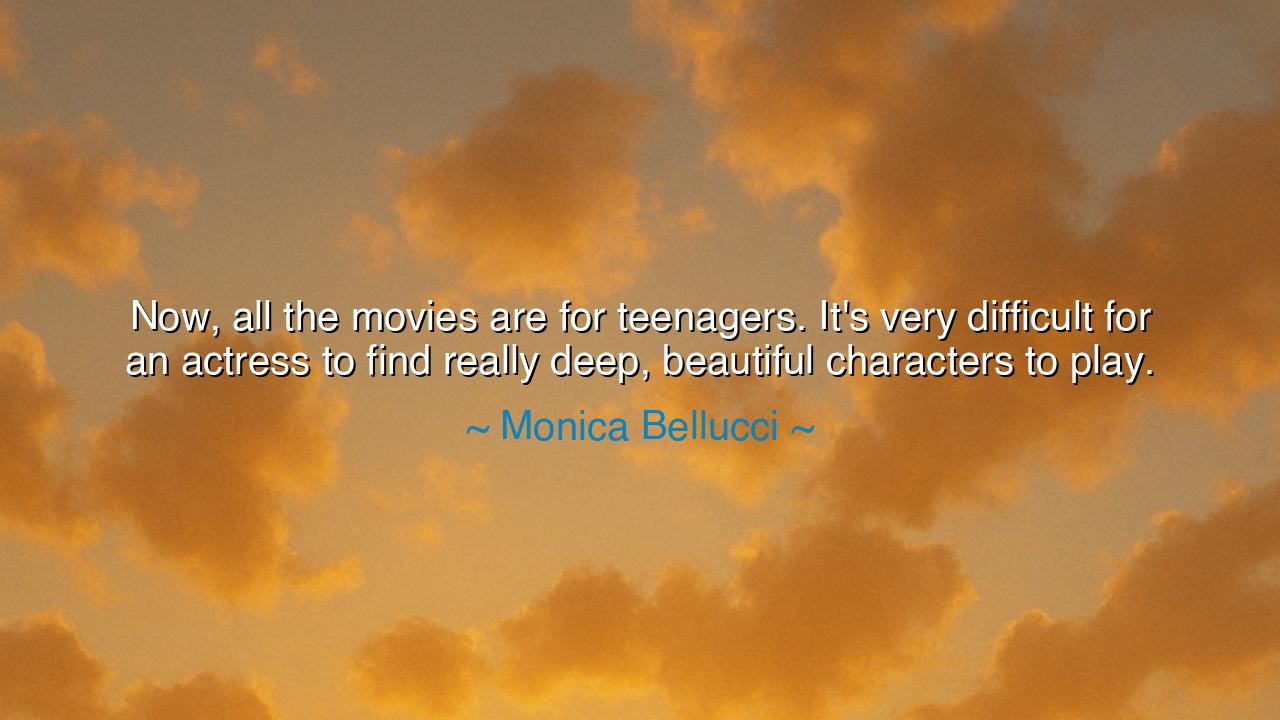
Now, all the movies are for teenagers. It's very difficult for
Now, all the movies are for teenagers. It's very difficult for an actress to find really deep, beautiful characters to play.






Listen, O seekers of wisdom, to the words of Monica Bellucci, who speaks with a profound understanding of the shifting tides of art and culture. She said, "Now, all the movies are for teenagers. It's very difficult for an actress to find really deep, beautiful characters to play." These words, though spoken in the context of cinema, resonate far beyond the realm of film. They speak to a broader truth about the evolution of art and storytelling, and the way in which society’s values shape the roles that artists are given to play. In an age where the young are revered, where superficiality often takes precedence over substance, true artistry can sometimes be lost, leaving little room for characters that challenge the depth of the human spirit.
To understand the gravity of Bellucci’s statement, let us reflect on the nature of true artistic expression. In ancient times, the great tragedies of Sophocles, Aeschylus, and Euripides were not made for teenagers; they were made for an audience that sought to understand the complexities of the human soul. These works were not about fleeting pleasures or superficial stories, but about the deep struggles and moral dilemmas that defined human existence. The characters in these plays were often flawed, tragic, and deeply human, embodying the highest virtues and the darkest vices. Their depth spoke to a timeless truth about humanity—themes of fate, love, and loss—that transcended the age of their creation. The greatest art, then, was not about catering to the masses, but about revealing the truth of the human condition, challenging the audience to reflect on their own lives.
Bellucci's lament about the state of modern cinema is echoed by those who recognize the shift from depth to instant gratification. In today’s world, movies are often made to appeal to the youth, focusing on action, spectacle, and superficial romance rather than on the complexity of characters and their inner struggles. The superficial, often glossed-over depictions of life rarely explore the deep, rich emotions that define human existence. It is as though the modern world, in its rush toward instant pleasure and distraction, has forgotten the importance of reflection, introspection, and the beauty of depth that was once so central to the artistic experience. The depth of the human soul cannot be captured by fleeting images or quick pleasure—it requires patience, understanding, and, above all, the willingness to face the darker, more difficult aspects of life.
Let us look to the example of Hedy Lamarr, a legendary actress of Hollywood’s Golden Age. Though she was known for her beauty, she was also a brilliant inventor, developing a frequency-hopping technique during World War II that would later become integral to wireless communications. Lamarr’s life shows that true artistry and intellect are often buried beneath the surface, ignored or overlooked in favor of more glamorous, easily digestible narratives. Like Bellucci, Lamarr knew the struggle of being more than just a pretty face in a world that demanded simplicity. And yet, despite the limited roles she was given, Lamarr’s intelligence and innovation transcended the screen. Her story is a testament to the depth of the human soul, hidden beneath the veneer of what society often demands of its art and its artists.
In the past, great actresses like Katharine Hepburn and Meryl Streep have defied the conventions of their times, choosing roles that required them to go beyond the superficial and delve into the heart of what it means to be human. Hepburn’s characters were often complex, strong, and defiant of the social expectations placed upon women, while Streep’s portrayal of characters ranged from the deeply tragic to the incredibly humorous, reflecting the full spectrum of human emotion. These actresses chose roles that challenged them and, in turn, challenged the audience. Their success was not in the roles that were easy, but in the ones that required courage, commitment, and an embrace of complexity.
The lesson that Bellucci’s words impart is this: we must not be content with the superficial, the instantaneous, or the shallow. True artistry, whether in cinema or in life, lies in the willingness to confront the depths of the human experience. We must not shy away from the difficult, the complex, and the challenging. In our own lives, we must resist the temptation to settle for easy answers or shallow connections, and instead, seek out the rich, complex experiences that will truly allow us to grow and reflect. Just as an artist must dare to dive deep into the soul of a character, we too must be willing to delve deeply into the nature of our own lives, to embrace complexity, and to strive for more than what the world offers at face value.
And so, O children of the future, take this lesson to heart: in a world that often values the shallow, the quick, and the immediate, let us seek the depths. Let us pursue truth in its most profound forms, and demand art that challenges us, that speaks to the complexities of our souls. Whether in cinema, in art, in relationships, or in our inner growth, let us always strive for the beautiful and the deep, and never be satisfied with the easy and the fleeting. Like Bellucci, let us resist the allure of superficiality and seek the true depth of the human experience.






AAdministratorAdministrator
Welcome, honored guests. Please leave a comment, we will respond soon